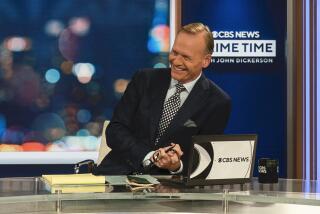KEN BODE : Reviewing the First Year of the New ‘Week’
- Share via
In early 1994, when Paul Duke left “Washington Week in Review” after 20 years as host of the PBS show, CNN reporter-analyst Ken Bode’s becoming host seemed a huge change for such a steady program. Duke always quietly deferred to his more opinionated, widely respected round-table of journalists, including veterans Charles McDowell (political reporter for the Richmond Times-Dispatch), Jack Nelson (Washington bureau chief of The Times) , Hedrick Smith (independent journalist, formerly of the New York Times), Gloria Borger (U.S. News & World Report) and Haynes Johnson (independent reporter).
Bode, in his mid-50s and director of the Center for Contemporary Media at Indiana’s DePauw University, brings a feistier tone to the proceedings, which strive to provide a balanced review of the week’s top national and international news. Describing himself as a “working journalist among many,” Bode talks with writer Robert Koehler about the new look of “Washington Week” and how the changes in Washington have affected the show.
For loyal “Washington Week” viewers, the changing of hosts from Paul Duke to you was a big deal. Was it for you?
I had been a regular viewer, but since I lived 650 miles away in Indiana, I wasn’t aware of the big stir caused by Paul’s leaving. To my surprise, the show’s producers called me to ask if I was interested. I was enjoying myself a lot at CNN, and skeptical that I could do two TV jobs at once. But the offer was awfully attractive. Remember, I had never been on the program, so I must have been as much a mystery to them as they were to me. To prepare, I looked at 20 past broadcasts, and took notes as if I were a media critic. Then, I spent time picking Paul’s brain about how he operated.
*
What’s your typical schedule for preparing a show?
We go into detail on Monday to plot the week fairly early, then again on Thursday. I spend the first part of the week at my home southwest of Indianapolis, where I work at De Pauw’s state-of-the-art media center. We’ll usually call each reporter to make sure what they’re working on, give them my view, and then talk with guests if there are any. We have what our producer Sue Ducat calls “a typical Monday discussion” that goes, “What’s on your mind Ken?,” ’What’s on your mind Sue?’ You always watch for Friday events to see if they pop up and break a story, such as one week when Hillary Clinton had a Friday press conference. The show isn’t scripted. I encourage the reporters to exchange politely (but) I don’t even have to urge that--everyone knows how the show works.
*
How do you improve, though, on what many consider the best of the weekend political chat shows?
It’s not easy, because Paul and these reporters have set such a high standard. It’s important that the panelists really cover the topic they cover, and while you hope for fresh faces, new people who are smart, you also have to remember that viewers are loyal to certain panelists, like Charlie (McDowell) or Gloria (Borger). You continue with what works best, and introduce new elements. One is more remotes, with reporters in the field. I believe a lot of Washington stories can best be learned outside of Washington--after all, these policies affect people who aren’t in Washington. You can get an expert in D.C., but if you can get journalists on the front lines, that’s best of all. We’ve done this with The Times’ Bob Drogin, which was outstanding, with Anne Jarrels vividly describing the warfare in Chechnya, and with Howard Fineman from Iowa. Another innovation is that panelists will appear right after broadcasts on America On-Line, although that’s only useful to viewers in the Eastern time zone since we’re delayed on the Pacific coast.
*
Has the dramatic Republican victory in November affected reporting for the show?
It’s energized the whole city of Washington. There are so many new politicians to learn about, and we’ve got a new political superstar in Newt Gingrich and the firmament around him. Usually you don’t have much change in a midterm election, but here’s a huge change with an incendiary personality. So this is really terrific for the business of journalism. We’re going to look closely at the partisan rancor on Capitol Hill, and how TV is having problems covering the substance and bill-making process instead of just the wrangling.
*
Considering the broad public contempt of Washington, do you blame it on the media, or is there another culprit?
The Brookings Institute recently issued a book on Congress and the press, and its results reportedly showed that press coverage has caused a negative public view of Congress. I looked at the book, though, and found that it didn’t back up its own thesis. Scandal stories, for instance, weren’t the majority of stories at all. There’s a very fractious atmosphere on Capitol Hill--I don’t know how else to report it. And we in the press can’t put on a hairshirt, beat ourselves up and say we’ve done a terrible job covering Congress, when these people have been beating up on Congress while running for reelection!
“Washington Week in Review” airs Fridays at 8 p.m. on KCET and 8:30 p.m. on KOCE.
More to Read
The biggest entertainment stories
Get our big stories about Hollywood, film, television, music, arts, culture and more right in your inbox as soon as they publish.
You may occasionally receive promotional content from the Los Angeles Times.










